Last Updated on December 29, 2025
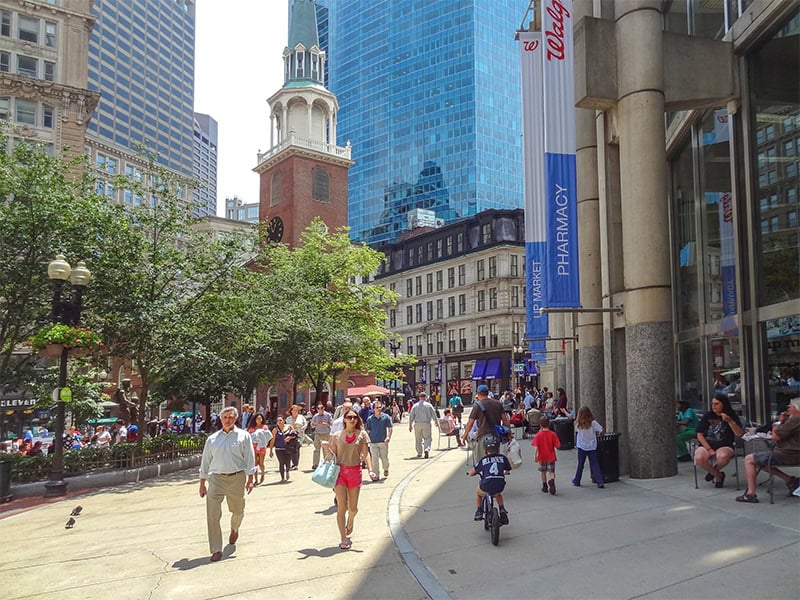
Estimated reading time: 11 minutes
By Jim Ferri
The Boston Freedom Trail, experienced either self-guided or with a guide, is one of the most popular walks in America. What makes it so interesting is that on the tour, you’re both seeing the beauty of the city while having the early history of America come alive.
With a few hours to spare one morning, I decided to walk the trail. My self-guided tour of the Boston Freedom Trail took me 2.5 miles past 16 historic sites, each of which is significant in the early history of America. Admission to each site is free unless noted otherwise below.
Along the Freedom Trail you’re guided from site to site by a line of bricks set in the sidewalk. Since this is a busy major city, once in a while you may encounter some areas in need of repair. A couple of times, I lost track since bricks were missing on torn-up sidewalks.
Table of contents
- Park Street Church
- Graves of John Hancock and Paul Revere
- A Surprise on the Boston Freedom Trail
- Old South Meeting House – An Important Boston Freedom Trail Stop
- A Popular Freedom Trail Stop: Faneuil Hall and Quincy Marketplace
- Finding a Wonderful Food Store On the North End
- Paul Revere’s House
- The Old North Church on the Freedom Trail
- If you go:
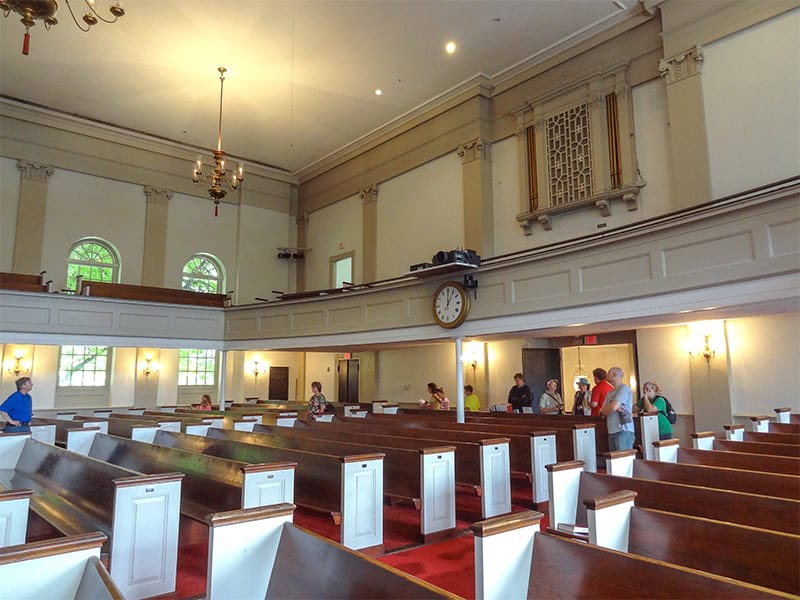
Park Street Church
To begin my self-guided tour of the Boston Freedom Trail, I left the subway at Park Street, right at Boston Common. Across the street was Park Street Church, one of the gathering places for colonial patriots before the American Revolution. I crossed the street and walked up the stairs to enter the church. There, I and passed through leather-covered doors into the spacious sanctuary. Long pews and balconies there ran across the back and down the sides.
Eavesdropping on a docent speaking with some other visitors, I realized the church wasn’t from colonial times as I thought. It was, however, built in the early 1800s on the site of an old granary. In fact, the old Granary was where colonists made the sails for the USS Constitution, also known as “Old Ironsides.”
This Boston church, however, is historical in its own right. It became famous for supporting Abolitionist causes long before the Civil War. It’s a beautiful church with clear windows. They’re clear, according to the docent, so one can see the Commons on one side and the Granary Burial Ground on the opposite.
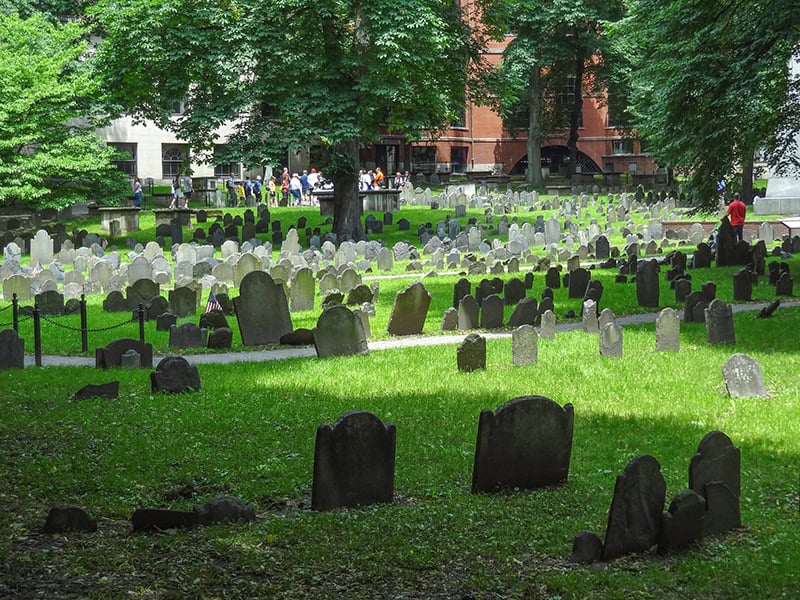
Graves of John Hancock and Paul Revere
I left the church and continued my self-guided tour along the Boston Freedom Trail. I walked about a hundred yards more to the adjacent Granary Burial Ground. There, I found a mini- “Who’s Who” of colonial America. Nearest to the church was the grave of John Hancock.
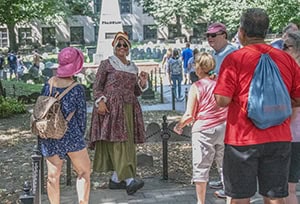
Graves of some of those who died in the Boston Massacre are also scattered about the cemetery. I discovered Paul Revere‘s towards the back. Covering both the marker next to his grave, as well as the actual grave site, were pennies and small rocks people had placed there.
It was a very peaceful and beautiful place despite it being located in a busy part of modern-day Boston. Walking about reading the tombstones made history come alive for me. I could now relate to these patriots as real people rather than just names printed in a school textbook.
A Surprise on the Boston Freedom Trail
The next stop on my self-guided Freedom Trail tour of Boston was the King’s Chapel Burying Ground. And I was amazed to learn it was actually older than the Granary. There are a few notables interred there, including Massachusetts’ first Governor, John Winthrop.
However, I hadn’t some to see the Governor, but rather the grave of Mary Chilton, the first woman to step off the Mayflower. At first I couldn’t find her tombstone until someone showed me the right direction. I found it almost hidden in the back of the cemetery. More astonishingly, the grave stone was facing in the opposite direction of all the others.
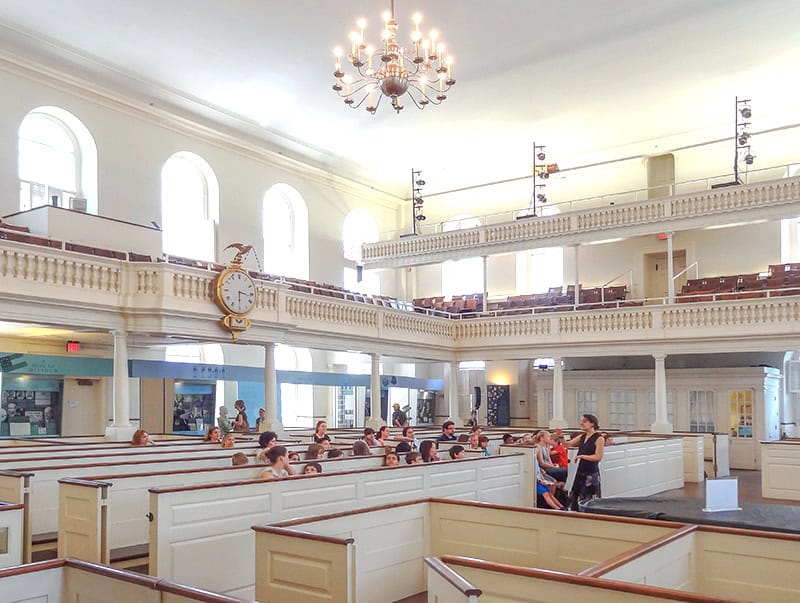
Old South Meeting House – An Important Boston Freedom Trail Stop
The Old South Meeting House is a national historic site. It’s high on the list of must-see’s on a tour of the Boston Freedom Trail, self-guided or not. When I entered, I found a woman explaining the tea tax to a group of grammar school children. The tax incensed the colonists and led to the revolution.
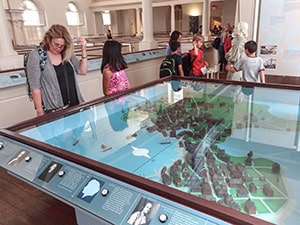
Chatting with her later, I found that the South Meeting House is actually overseen by a private nonprofit organization, Revolutionary Spaces. In the very places where the colonists once sat in their meetings, they now give presentations to schoolchildren. The children then debate the pros and cons of the tax as if they were colonists.
“It’s not exactly accurate most of the time,” she confided in me. “But the kids really get a sense of the history and the basis for all of the things they’re learning.”
The most interesting exhibit in the place, however, was the model of Boston in 1773. Although the kids could care less about the display, it was mesmerizing to most of the adults who were seeing not only how small many of the buildings were at the time of the American Revolution but also just how small the actual town of Boston was at the time. By today’s standards it would be considered a small country village. It is exceptionally well done; you can read a brief description of a person’s home and then press a button to see its location.
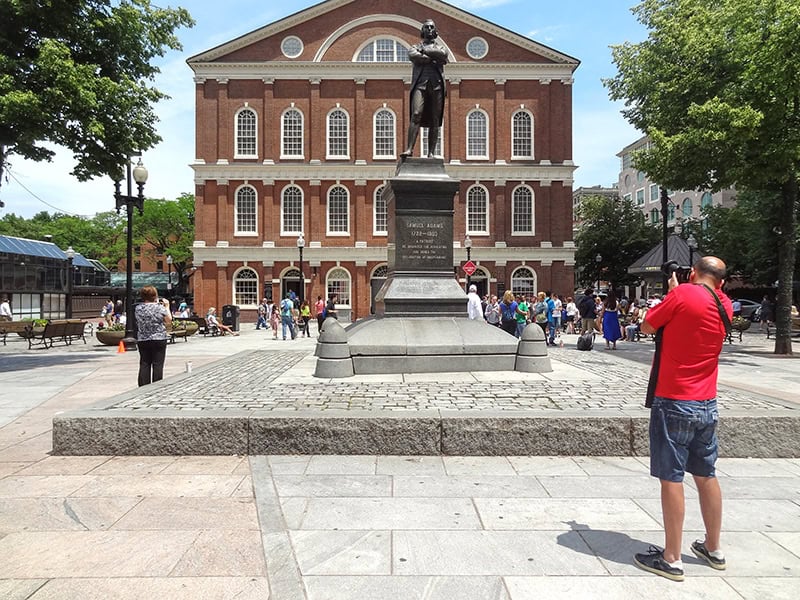
A Popular Freedom Trail Stop: Faneuil Hall and Quincy Marketplace

Back out walking along the Boston Freedom Trail, I began to realize just how many people were doing the same thing I was. Many had maps in hand, while several others were taking self-guided tours via apps on their phones or a map on their iPads. A few times, I had to ask one of them for directions.
Afterward, I visited Faneuil Hall and the frenetic Quincy Market, the latter always crowded, regardless of the season, and bursting at the seams with numerous shops and food stalls. Having been there before, I did little more than stick my head in for a quick look and continued to follow the trail up into the city’s Italian North End.
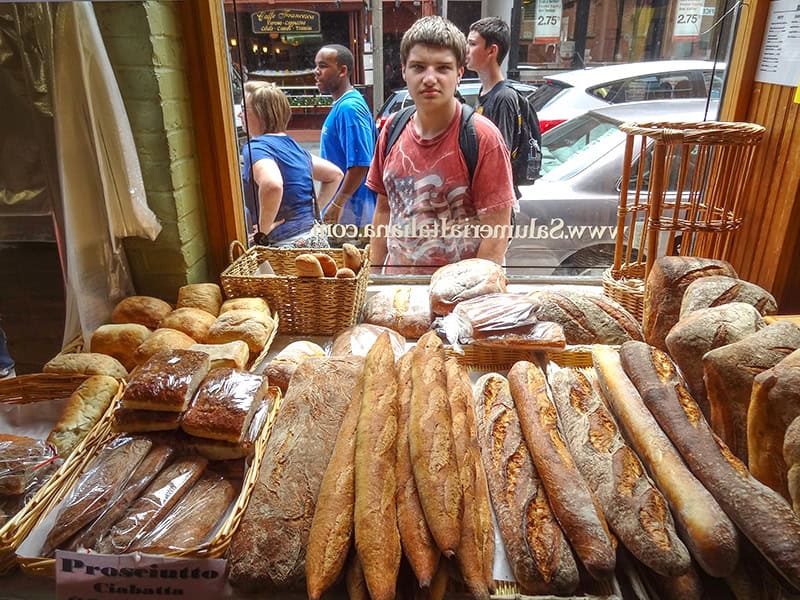
Finding a Wonderful Food Store On the North End
One of the interesting things about a self-guided tour on the Boston Freedom Trail is that you have the opportunity to step off it whenever you see something of interest along the way. You can’t do that on a group-guided tour.
That’s what happened to me when the Boston Freedom Trail turned onto Richmond Street in Boston’s Italian North End, and I saw Solamuria Italiana, boasting itself as Boston’s best Italian grocery. Ducking inside, I could see why: the sight inside the little grocery was exceptionally appetizing. And it was full of local old Italians in the area.
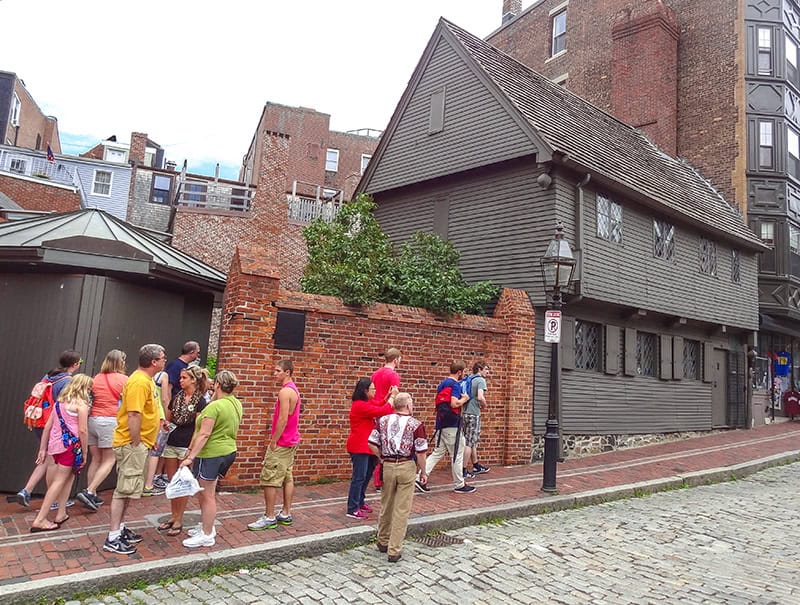
Paul Revere’s House
I was tempted to buy a sandwich at Solamuria Italiana but didn’t. After a few minutes I instead headed back out the door to search for Paul Revere’s house a few blocks away.
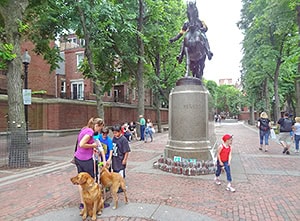
It was disappointing that you’re not allowed to take photos inside Revere’s house. But it is interesting since you get to see precisely what houses were like in colonial America. Everything inside the house was a period piece, some of which were owned by Revere himself. (Admission is $6.00 per adult, seniors and college students $5.50 and children (ages 5-17) $1.00).
The next stop was the Old North Church, which you access on the Freedom Trail via the Paul Revere Mall across from the church Rose Kennedy used to attend. On the little mall is a statue of Revere on horseback
You may also enjoy: Civil War (and Other) Reenactments in the U.S. / Visiting America’s Industrial Past / The Maine Coast: A Great Summer Road Trip
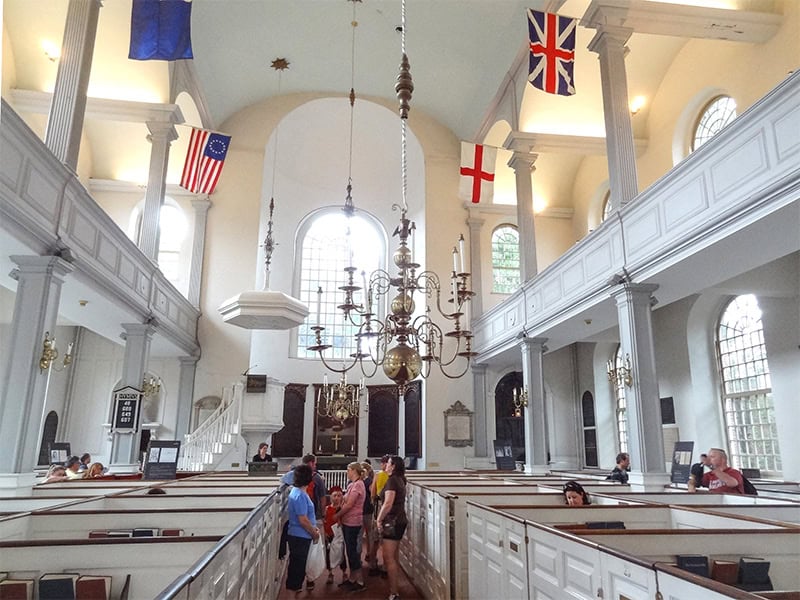
The Old North Church on the Freedom Trail
Old North Church was interesting only in that it gave a sense of how people worshiped at the time. The family pew boxes in the church were surprising, as was the archaeological dig being done at the 1715 Clough House next door. After the church, I visited the nearby mildly interesting Copp’s Hill Burying Ground, where I only stayed a few minutes.
I had a similar reaction to Bunker Hill before continuing on to the USS Constitution, the final site on my self-guided tour of the Boston Freedom Trail. The walk there seemed much longer than I had anticipated, probably due to the rain that had started to fall as I left Copp’s.
The tour of the USS Constitution, known as “Old Ironsides,” was quite enjoyable, as well. However, the weather put a damper on it, as we weren’t given an on-deck tour, only a below-deck one.
We were shown around the gun deck by a seaman who provided us with a wealth of information about the ship’s history and what it was like to live aboard it. Among the shared minutiae was that although the boat had a crew of almost 500, it carried only two cooks – one for the Captain, the other for the crew.
If you’re in Boston, a self-guided tour of the Freedom Trail is well worth a leisurely day or a busy half-day walking tour, especially if you’re an American, since it puts you in touch with our country’s history. Non-Americans will also find it interesting from a cultural and historical perspective.
However, with all the stops, it’s a long walk, and you may want to trim the tour a bit if you plan to spend considerable time at each historic site.
If you go:
The Freedom Trail Foundation
99 Chauncy Street, Suite 401
Boston, MA 02111
Tel: (617) 357-8300
http://www.thefreedomtrail.org/
Greater Boston Convention and Visitors Bureau
2 Copley Place, Suite 105
Boston, MA 02116
Tel: (888) 733-2678
http://www.bostonusa.com/

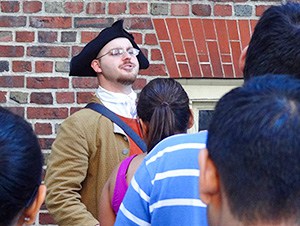
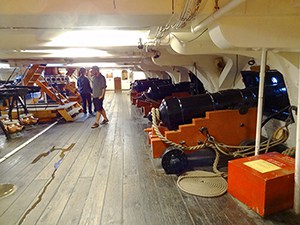
Leave a Reply